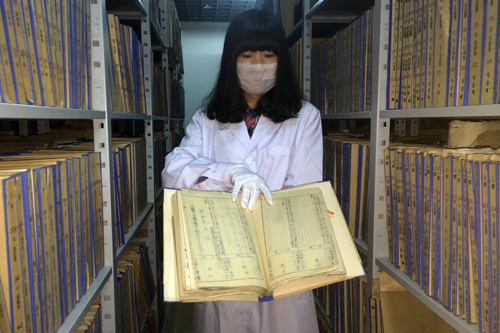|
 |
|
SEEING IS BELIEVING: A worker with the Jilin Provincial Archives displays documents showing Japanese troops' war crimes in China during WWII on April 23 (LIN HONG) |
The Jilin Provincial Archives in northeast China recently made public 89 documents on Japanese troops' wartime crimes in China. The documents, which include official reports and personal letters, once belonged to the invading Japanese army in Changchun, capital of Jilin Province. During Japan's occupation of northeast China between 1931 and 1945, Changchun functioned as the capital city of the puppet Manchurian regime installed by Japanese forces and also the headquarters of the Japanese Kwantung Army.
The documents in the Jilin Provincial Archives provide details of the Nanjing Massacre, in which more than 300,000 Chinese people were killed by Japanese soldiers after they occupied Nanjing in east China's Jiangsu Province, the then Chinese capital, in December 1937. They also reveal other atrocities committed by Japanese troops in China during World War II (WWII), including the exploitation of "comfort women" in sexual servitude, testing of chemical and biological weapons on humans by Unit 731, and the maltreatment of U.S. and British prisoners of war.
According to researchers at the Jilin Provincial Archives, the 89 documents are only the tip of the iceberg. In total, there are nearly 100,000 volumes and files within the archives, 90 percent of which are written in Japanese and reveal many of the atrocities of Japanese troops.
Shortly after the Japanese surrender in August 1945, the Japanese army set fire to a large amount of its wartime archives before their retreat and buried what they did not manage to destroy. Fortunately, in the 1950s, some of the documents were excavated from a construction site and it became possible to bring the travesties of the era to light. Although many of the documents are fragmented or incomplete, experts from the Jilin Provincial Archives have managed to restore and translate large numbers of them.
Tangible evidence
For a long time, the Nanjing Massacre has been denied outright on many occasions by Japan's right-wing forces, who use excuses such as claiming the population in Nanjing before Japanese occupation was no more than 300,000.
Six of the newly released documents directly and indirectly portray the Nanjing Massacre, during which Japanese troops rampaged through the city for six weeks, killing, raping and looting.
Two reports on an investigation into "restoration of public order" by Commander Ooki Sigeru of Japan's Central China Dispatched Kempeitai on February 19 and 28, 1938, suggest that the population of Nanjing fell from about 1 million to 335,000 during a 10-week period that included the massacre.
The population figures provided by the Japanese commander provide strong evidence for the massacre, said Jiang Lifeng, a senior research fellow at the Institute of Japanese Studies under the Chinese Academy of Social Sciences.
Among the six files is a letter dated January 1, 1938, from a person surnamed Zhi in Rokunerusutaaru, Germany, to a person surnamed Yuan whose address was 27 Oxford Road in the British settlement in north China's Tianjin. Recorded in the February 12-18, 1938 issue of the Japanese military-owned Postal Review Weekly, the letter reads, "A British newspaper that published a letter written by a UK priest living in Nanjing saying that the brutal acts of the enemy soldiers (the Japanese army) in Nanjing made one's hair stand on end. All the women aged 14 or above were raped, including Buddhist nuns. The priest tried many times to persuade the commander of the enemy troops not to do so but it was of no avail."
"As the facts of the shocking crimes committed by Japanese troops have emerged, those who were working on restoring the files found the work to take a very heavy toll on them emotionally and psychologically," said Yin Huai, Curator of the Jilin Provincial Archives. "Despite this, we have managed to remain professional and not let any negative feelings get in the way of revealing the truth."
Yin said that the documents have filled the gaps in studies on Japan's aggression in China and have restored a truthful perception of that period of time. "They also provide an irrefutable rebuttal to denials of Japan's wartime crimes in China," he added.
In recent years, there has been a growing tendency for Japan's right-wing forces to deny and distort history to achieve their political ends or mislead the international community.
In 2012, Takashi Kawamura, Mayor of Nagoya, told a visiting delegation from Nanjing that the Nanjing Massacre was unlikely to have taken place.
Japanese Prime Minister Shinzo Abe said that "the definition of what constitutes aggression has yet to be established in academia or in the international community" while at a parliamentary meeting in April 2013.
On February 16, Sankei Shimbun, a leading Japanese newspaper, published an article titled It is True that the Nanjing Massacre Never Happened.
| 